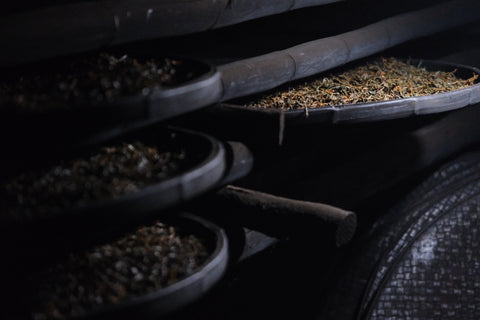Masu Village: Chasing Tongmuguan Black Tea
 Masu Village, Tongmuguan. This incredibly remote region of the world is home to the first ever black tea. The locals that live here exist in a kind of time warp. Outsiders aren’t easily allowed in. Even Chinese citizens can’t just waltz into this protected Nature Reserve. The tea farmers and makers here have been doing things in their old fashioned ways for hundreds of years.
Masu Village, Tongmuguan. This incredibly remote region of the world is home to the first ever black tea. The locals that live here exist in a kind of time warp. Outsiders aren’t easily allowed in. Even Chinese citizens can’t just waltz into this protected Nature Reserve. The tea farmers and makers here have been doing things in their old fashioned ways for hundreds of years. 
We met Beibei Zhang by chance in Wuyishan City (some 40km from Tongmuguan). She is one of the village heads of the Masu Village, and after one taste of her teas, we were dying to have a look at their source. Beibei told us that Tongmuguan has 12 different production villages and Masu is one of the most respected for its high elevation and very old


As mentioned, not anyone can get into Tongmuguan. So while we crossed the checkpoint we stayed quiet in the back of Beibei’s SUV.


After two hours of bumpy muddy roads and over a thousand hair pin turns, we finally arrived in Masu Village.


We were excited to see the trees and the processing, but like always, first things first: Lunch.


Behind their old home and the production facility stands a very small plot of incredibly old, gnarly, moss covered black tea trees. We have never ever seen black tea trees that look like this. It was really a marvel to behold.


Behind the maybe acre of tea trees rises a bamboo forest. Other than tea, their main export is bamboo, and they eat it with nearly every meal. Scattered in this bamboo forest are pine trees and among them, the native and elusive Horsetail Pine; whose wood is used to give the Tongmuguan Lapsang Souchong their very iconic pine smoke aroma.

The Zhang family can trace back their tea production five generations, but no one was really counting. It was more them talking about how even their grandpas grandpa was living here growing these tea bushes and making tea.

This is Beibei’s Grandpa, Grandpa Zhang. He told us about how in the late 1989 they built the first road connecting Masu Village (at a height of 1250 meters) with the lower villages of Tongmuguan. Before that, all the tea they made had to be brought down on foot.
With the road came new technology. Ways to make a tea that don’t involve smoking it for days in a wooden house. This was called, in a pragmatic stroke of brilliance by the producers the “New Production Method” or the 新工艺.


Grandpa Zhang has since championed this smoke-less Laosang Souchong. While it can be seen as a turning away from tradition, it also marks a wonderful paradigm shift in the technological development of a region. Even though Zhang has been making Lapsang in the new style for the part 30 years, the 20 years of tea making experience he had before that hasn’t disappeared. He knows what the tea needs with just at glance, a slight touch, and often even less. When we were there he told us that the rainy weather is best for oxidizing the teas, the humidity helps speed along the process. They also don’t use machines to oxidize the teas (we’ve seen many black tea makers who throw the tea into a large metal oven called an oxidization machine). Here the tea is just set in bamboo baskets, and sometimes covered with a cloth if the weather is too dry.

This is Beibei’s Dad, Mister Zhang. He is the main producer of the traditional smoked Lapsang Souchong and takes care of the family’s Qinglou.


A Qinglou is a wooden house used specifically in this region for smoking the black tea. Into the subfloor is built a stove where they burn pinewood.


The floor of the first floor has bricks placed in such a way to allow smoke through but no flame.

Tea that has already been withered, rolled, and oxidized is placed on this first floor for final baking and drying.

Tea that has just just been picked is placed on the second floor, further away from the smoke, but still in range of the steady heat. This second floor is comprised of simply a thickly woven bamboo mat, which allows plenty of heat and smoke through.


The Zhang family have been making Smoked Laosang Souchong like this for generations, and it is really a wonder we were able to see their process and learn about it all so directly!


We are incredibly excited to be able to offer such amazing tea from a wonderful family in a stunning location!
Be sure to check out the Zhang Family's Masu Village Sample Box here!
These teas are superb. The sample box is an informative look at different production methods and types. I’ve enjoyed Zhengshan Xiaozhong from a number of different vendors selling varying quality of lapsang souchong from different sources, but these are by far the best. I hope you will be able to continue offering the Zhang family’s product.